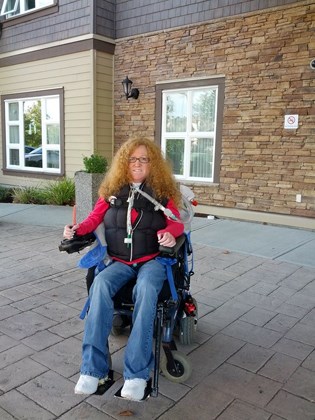A disabled woman who wants to live independently in her own apartment says she's being denied the chance for a normal life by an unfeeling health care bureaucracy.
Richelle Bellis is 43 and has muscular dystrophy, which means she needs a ventilator and round-theclock assistance. But Bellis says she is also relatively young, and wants a chance to live a regular life.
With the help of an advocate, Bellis recently found a subsidized apartment in North Vancouver, rented it, and moved her belongings and equipment in.
"I've been paying for it since June 1," said Bellis. "Technically that's where I live."
She even found a local family doctor.
But Bellis said after she did all that, Vancouver Coastal Health turned down her application for the funding program that would allow her to live in the apartment.
Instead, she's stuck in CareHome Fleetwood, a residential care home in Surrey where Bellis said she's told when and what to eat, when she can shower and spends her days on the computer, surrounded by elderly people.
"It's a very depressing situation," said Jeanette Poulsen, an advocate who helps people with disabilities navigate the health care bureaucracy.
The Choices in Support for Independent Living program that Bellis applied for provides money for people with high physical care needs to live independently in their own homes. Under the program, patients hire and train their own staff and are responsible for all financial accounting. Patients can also have volunteers help them with those tasks.
Poulsen said that's what Bellis had in place - a team of helpers including an accountant who were prepared to help her manage the program.
But at the eleventh hour, Bellis learned she was being denied funding based on the complexity of the care she required and the risk that she couldn't manage the program.
Anna Marie D'Angelo, spokeswoman for Vancouver Coastal Health, said only a small number of people qualify for the program. Managing it is "a huge task," she said. D'Angelo added the program isn't intended for people who need 24-hour care. The maximum funding is for up to 16 hours a day, she said. D'Angelo said there are still opportunities for people with disabilities to live in the community. Some people choose to live in group homes or share accommodation and split the costs for caregivers.
But Poulsen argued the health authority is taking an overly rigid approach. She said many patients stretch the funding by paying a lower rate for care attendants.
Although health authorities refused to speak directly on Bellis's case, Poulsen acknowledged a prior stint on the program that Bellis eventually found too difficult to manage might be playing a part in the decision. Poulsen said that isn't fair. Since then, "people in the community have stepped up," to offer help, she said.
It isn't the first time a disabled person has had to fight for the chance to live independently on the North Shore. Paul Caune, who is confined to a wheelchair and a ventilator, also took on health authorities after he was moved from the North Shore to George Pearson Centre when he was in his late 30s.
Caune was eventually successful in moving to a private apartment - but off the North Shore.
Since then, Caune has formed a North Vancouverbased group that advocates for those with disabilities called Civil Rights Now. Poulsen and Bellis are both involved in the group.
Since Bellis has been confined to the residential care facility, "There were two job interviews she had that she couldn't go to," said Poulsen. "Fleetwood doesn't take people out on job interviews."
Poulsen said it's fundamentally unfair to strip young mentally healthy people of their right to determine where and how they want to live just because they have a physical disability. "This can happen to any one of us on any given day," she said. "Nobody's exempt."



